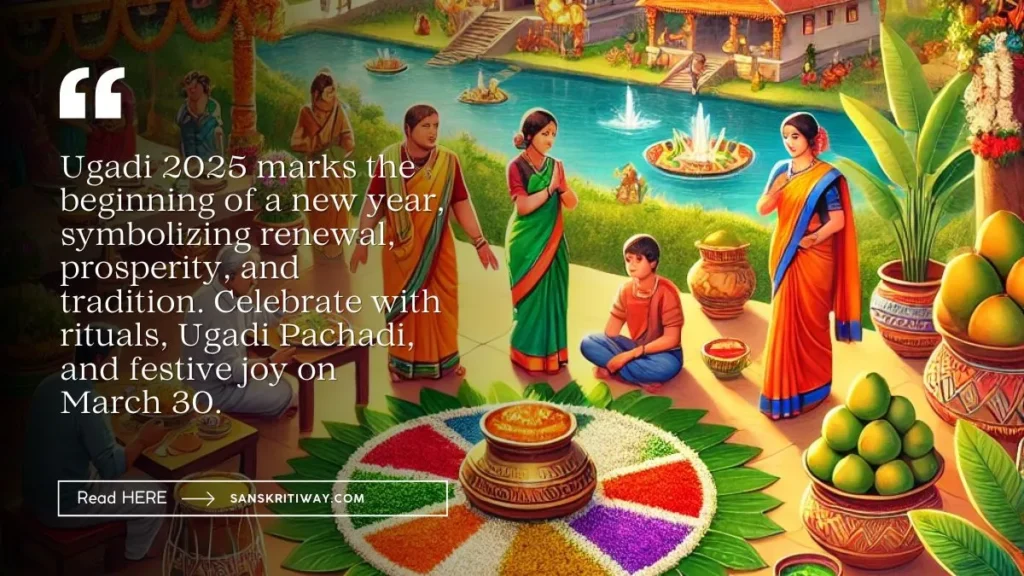As Ugadi (or Yugadi) approaches, it is time to celebrate another Indian festival in Shri Kashi Vishwanath Temple. The terminology stems from two Sanskrit words, the growing seasons (Yuga) and age of (Adi), thereby signifying the renewal of life. The festival commemorates the upcoming year and its potential accomplishments. People have practiced the occasion with numerous family observances and spiritual gatherings. The festival holds a deep meaning through visible auspicious signals at the start of every primaveral season.
Spending time with your family during this time involves partaking in Ugadi’s mark at the very heart of the Indian calendar. Farmers and laborers welcome the arrival of spring during this time of year. Nature is at its peak during this time along with life renewal. In order to fortify their societal ties, families dedicate a portion of their family time to engaging in free-time activities, which are then followed by formal prayers and other state-sponsored observances at the national level.
Ugadi 2025 Date & Muhurat
Ugadi is on March 30, 2025, a Sunday. The Hindu religion celebrates it on the first day of Chaitra Chandra, which is said to begin on the Spring Equinox and marks the onset of the harvesting season. The Ugadi Muhurat time differs from state to state due to regional Panchangs, and supporters make sure to perform rituals during the most favorable time of the day. The festival also has links with the movement of celestial bodies, defining the start of a new lunar calendar.
Significance of Ugadi
Culturally, religiously and astrologically, Ugadi is important for some people. In Hinduism, it is said that the creator of the universe, Lord Brahma, started time and the order of nature on this day. The Bhagavad Purana, started by Lord Brahma, refers to Kalyuga, one of the four epochs, as the modern stereotype. This is also considered important in Vedic Astrology because it begins a new planetary cycle, which affects the energies and incidents for the rest of the year.
Ugadi is the time for the harvest season, which is quite useful for farmers. During this time of the year, farmers prepare for new agricultural activities while praying for plentiful rains and fertile land. Furthermore, these festivals serve to recharge the spirit and manifest positivity along with the appeal of divine blessings. Many devotees deteriorate their food intake and perform acts of charity, which marks the phenomenon known as fasting, self-discipline and generosity.

Ugadi Festival Traditions & Celebrations
Preparations for the Festival of Ugadi begin an entire week earlier, and the celebrations are quite lively with a systematic approach followed to enhance one’s houses and decorate them using Rangoli (Muggulu) and portraying mango leaves at the gates. Cleansing of the house depicts the negative energies, while the energetic decorations welcome prosperity along with positive fortune.
Key Rituals of Ugadi:
One of the earliest and most important customs of Ugadi is the ceremonial oil bath known as the Abhyangana Snanam before dawn. Before swimming in pure water, devotees get up early to rub sesame oil all over their bodies. Considered as a fresh beginning to the new year, this practice is said to cleanse and renew the body and the psyche.
Panchanga Shravanam is another important custom whereby family elders or astrologers use the Hindu almanac (Panchang) to forecast the fortunes of the next year. Deeply adored is this ceremony, as it emphasizes lucky dates, beneficial planetary placements, and important occurrences.
Devotees attend temples to pray as well as to seek blessings for optimal health, success, and wealth. Special pujas are performed by many people and entire communities singing Vedic mantras and kneeling in respect before gods.
Ugadi is a celebration of family and community strengthening of links rather than only a religious event. People take time off from business and education to visit family, present presents, and eat celebratory cuisine. Furthermore regarded as a lucky event for fresh starts, Ugadi is a common time to launch major projects, buy real estate, or open companies.
Ugadi Pachadi – The Taste of Life
Ugadi Pachadi is a dish commonly eaten during the festival mentioned earlier and symbolizes life by embodying its diverse flavors. There are six distinct ingredients in this unique dish that serve as a springboard for associated memories or emotions. They include:
- Neem (bitter) – Represents the difficulties and challenges in life.
- Raw Mango (sour) – Symbolizes surprises and new experiences.
- Jaggery (sweet) – Signifies happiness and contentment.
- Tamarind (tangy) – Denotes challenges and tough times.
- Chilli (spicy) – Represents anger and intense emotions.
- Salt (salty) – Stands for the essential aspects of life that bring balance.
Prepping for the Ugadi Pachadi is a lesson on how life is made up of different emotions, experiences and aspects that should be appreciated. Other than Ugadi Pachadi, Obbattu or Holige and Puliogare are also made in Karnataka, whereas Andhra and Telangana have their trademark Pulihora and Bobbatlu.
Ugadi 2025 in Karnataka, Telangana, and Andhra Pradesh
Every region of South India has its unique way of celebrating Ugadi. In Karnataka, for example, the festival is called Yugadi; people whip out traditional dishes and tasty desserts like Holige. They also perform special pujas in temples and have cultural dance and song programs. In Telangana and Andhra Pradesh, Ugadi Pachadi, along with other foods, is essential for the celebration. People also listen to the Panchanga Shravanam in temples. This date is widely considered beneficial for initiating new projects and receiving wishes from parents.
In Maharashtra, people celebrate Gudi Padwa, marking the new year, where they raise a Gudi outside their home, which symbolizes victory and prosperity. The worship holds historical significance and is believed to commemorate the victories of Chhatrapati Shivaji Maharaj.

Regional Names of Ugadi in India
While Ugadi is primarily celebrated in South India, different states observe similar New Year festivals under different names:
- Gudi Padwa – Maharashtra
- Baisakhi – Punjab
- Pohela Boishakh – West Bengal
- Vishu – Kerala
- Bohag Bihu – Assam
- Puthandu – Tamil Nadu
- Bestu Varas – Gujarat
- Navreh – Kashmir
Best Ways to Celebrate Ugadi 2025
The festival celebration revolves around blessings, gift giving, feasting, and asking for forgiveness. Here are a few suggestions:
- Sharing meals with family and friends while preparing traditional dishes like Ugadi Pachadi.
- Participating in worship by visiting temples.
- Listening to Panchanga Shravanam to hear the Zodiac signs for the upcoming year.
- Wrap the house with rangoli and mango leaf torpanas to make it festive.
- Make a major investment or undertake a new business activity on this ideal day.
- Exchange gifts and spend quality time with family while celebrating the spirit of the festival.
This festival marks a new start and brings hope and the richness of culture. It brings together families and communities in celebration of joy and prosperity. The celebration of festal meals, participation in social events, and following of customs make the festival important in India. On March 30th, 2025, we will celebrate Ugadi, which will allow us to remember the past, appreciate the present, and look toward the future with hope.
Visit Sanskriti Way
